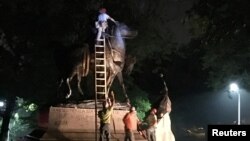U.S. President Donald Trump said Thursday it is "so foolish" for American cities to be removing statues commemorating Confederate generals and soldiers who fought on the losing side of the country's 19th century Civil War.
"You can't change history," Trump added in a string of Twitter comments,
Trump offered his thoughts on the Confederate memorials in the aftermath of last weekend's deadly street mayhem in Charlottesville, Virginia, where white supremacists were protesting the city's plan to remove a towering statue there honoring Lee, who led Confederate troops during the conflict that extended from 1861 to 1865.
The President has drawn widespread criticism from across the U.S. political spectrum for saying demonstrators representing an array of hate groups and counter-protesters shared blame for the violence that erupted, leaving one woman dead and 19 injured when a Nazi sympathizer drove his car at high speed into a group of counter-protesters. White nationalists, the racist Ku Klux Klan and neo-Nazis shouted chants against racial minorities and Jews at the rally.
Trump's chief White House strategist, Steven Bannon, in an interview this week dismissed the importance of the far-right in the U.S. political scene, even though he headed a publication advancing support for "America first" views before joining Trump's White House.
"Ethno-nationalism — it's losers," he said. "It's a fringe element. I think the media plays it up too much, and we gotta help crush it, you know, uh, help crush it more. These guys are a collection of clowns."
The Civil War is a seminal event in American history, fought largely over southern landowners' demands to own slaves and the secession of 11 states from the national government before Union troops prevailed in fighting that killed 620,000 people in combat and from starvation and disease.
The War Between the States has shaped relations between whites and blacks in the country ever since.A handful of cities has removed some of the 718 statues honoring the Confederacy's warriors, while others are considering taking them down.
There are mixed views in the U.S. about the effort to remove the statues from public sites, often parks and town squares, with most, but not all, of the statues in the South. Many are demanding their removal, saying they are a symbol of an indelible ugly stain- slave ownership - on the country's heritage that should not be celebrated.
Others, like Trump, are arguing that history should not be rewritten by removal of the statues, and note that some of country's Founding Fathers, including George Washington and Thomas Jefferson, owned slaves. Trump's tweet mentioning the country's first and third presidents, Washington and Jefferson, was the second time this week that he questioned to what extent those wishing to eradicate memory of slavery would attempt to erase history from the public square.
The U.S. national capital is named after Washington, and two of the city's most dominant memorials after Washington and Jefferson. There are 10 statues in the U.S. Capitol building depicting prominent figures from the Confederacy but they are likely to remain there.
Just this week, Baltimore, Maryland took down four Confederate statues in the dead of night, without announcing their removal ahead of time, so that protests, like those in Charlottesville, would not likely materialize. In Durham, North Carolina, protesters toppled a statue of a Confederate soldier that crumpled to the ground, but police charged four people with vandalism in the incident.





